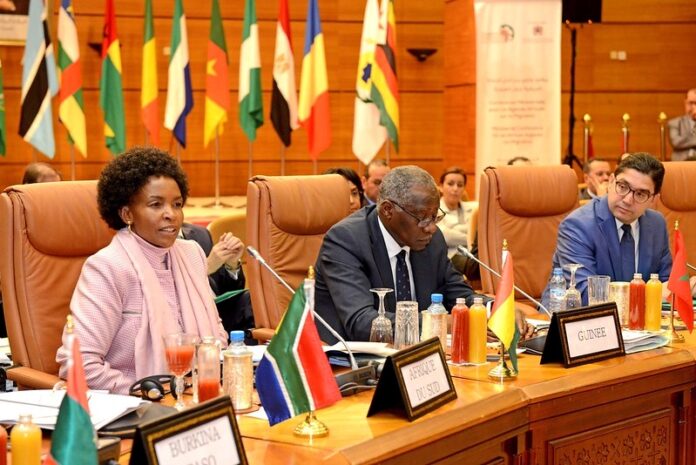A recent article by Omilusi, M. (2023) titled “African Union’s Migration Governance Framework, the Refugee Crisis and Challenges for Geopolitical Security” published in Turkish Journal of Diaspora Studies, examines that migration within Africa is predominantly intra-continental, influenced by demographic, economic, political, environmental, and conflict factors.
“
Intra-continental migration in Africa, influenced by diverse factors, poses geopolitical security threats, demanding collaborative regional efforts for effective governance.– Omilusi, M. 2023
This article explores migration and displacement issues in Africa, with a focus on the African Union’s migration policy frameworks, the refugee crisis, and the challenges for geopolitical security. The author posits that migration in Africa is characterized by diverse patterns and causes, such as conflict, violence, environmental degradation, socio-economic factors, and regional integration. The African Union has developed various policy instruments and initiatives to address migration governance and protection, such as the Migration Policy Framework for Africa, the Kampala Convention, and the Rabat Process. The study further explores that forced migration poses significant threats to national and regional stability and security, as well as humanitarian and development challenges, especially in sub-regions such as the Horn of Africa, the Great Lakes region, and the Lake Chad Basin. Emphasizing responsibility-sharing, the study underscores the need for collaborative efforts to provide lasting solutions for refugees, addressing both immediate challenges and root causes of displacement.
How the Study was Conducted
The author employed an in-depth desk review of migration-related issues in Africa, using secondary sources such as academic literature, policy documents, reports, and media articles. The study adopts a regional approach to analyze the different migration patterns, trends, and challenges in Africa, focusing on the role of the African Union and its policy frameworks. The study employs a critical discourse analysis to examine the gaps and limitations of the existing migration policy frameworks and their implementation at the national and regional levels. The author further employed a geopolitical security perspective to explore the implications of forced migration and refugee flows for the stability and development of the continent and its sub-regions.
What the Authors Found
The study reveals that migration within Africa is predominantly intra-continental, influenced by demographic, economic, political, environmental, and conflict factors. Despite the African Union’s establishment of various migration policies and legal frameworks for governance and protection, challenges persist in their implementation. Forced migration jeopardizes both geopolitical security and human rights, necessitating regional cooperation and global solidarity. Addressing the multifaceted challenges of African migration requires effective regional integration, cooperation, and shared responsibility, offering potential for developmental and societal transformation.
Why is this important?
Migration holds potential for positive economic and social impacts, like remittances, skills transfer, and trade. However, challenges such as brain drain, human trafficking, and social exclusion exist. Effective migration governance is crucial to optimize benefits and minimize costs for both origin and destination countries. Security concerns arise, especially in irregular, forced, or mixed migration scenarios. Governance can address root causes like conflict, poverty, and climate change, safeguarding migrants’ rights and dignity. Coordination among national, regional, and international actors is vital to prevent and resolve migration-related conflicts. While migration enriches cultural diversity, integration challenges may arise, making governance essential for fostering inclusion, mutual respect, and understanding. It also supports voluntary return and reintegration when conditions permit.
What the Authors Recommend
- The authors suggest that African countries should adopt and implement the AU’s migration policy frameworks, enhance conflict prevention and resolution, and support host countries and communities with adequate resources and assistance.
- The authors argue that African countries need to improve their data collection and analysis on migration trends, drivers, and impacts, and share information and best practices among regional and global actors.
- The authors propose that African countries should provide refugees with access to education, health, social services, and employment opportunities, as well as durable solutions such as voluntary repatriation, resettlement, and local integration.
- The authors emphasize that African countries should address the political, socio-economic, and environmental factors that trigger mass migration, and invest in human development and security for their citizens.
In conclusion, the study underscores the complexity of migration within Africa, shaped by diverse factors ranging from demographic shifts to environmental challenges and conflicts. While the African Union has implemented various policy frameworks to govern and protect migrants, challenges persist in their effective implementation. Forced migration emerges as a significant threat to both geopolitical security and human rights, necessitating collaborative efforts at regional and global levels. The findings emphasize the importance of enhanced regional integration, cooperation, and shared responsibility to address the multifaceted challenges of African migration. The recommendations put forth highlight the critical need for adopting and implementing AU migration policies, improving data collection, providing essential services to refugees, and addressing root causes through investments in human development and security. Ultimately, effective governance is pivotal in optimizing the positive impacts of migration while minimizing its associated costs, ensuring a balanced and inclusive approach that fosters societal transformation and mutual understanding.
















 The African Research (AR) Index is a comprehensive scholarly directory and database focused explicitly on journal publishers that publish and disseminate African research.
The African Research (AR) Index is a comprehensive scholarly directory and database focused explicitly on journal publishers that publish and disseminate African research.

